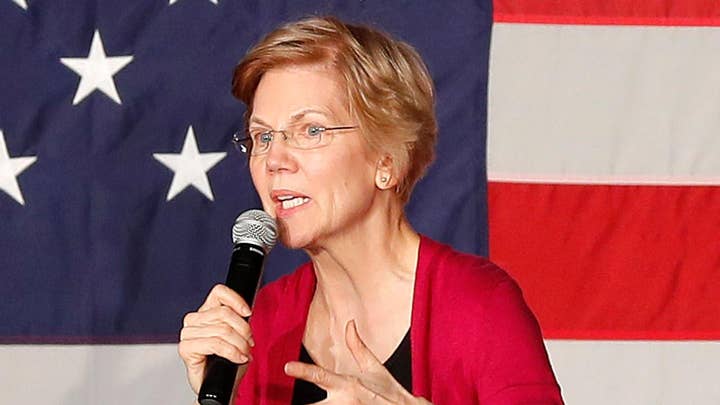Does Sen. Warren's 2020 bid raise the stakes for the rest of the Democratic field?
Aren't establishment leaders like Warren the reason many Dems are walking away from the party? #WalkAway campaign founder Brandon Straka reacts.
Call it Sen. Elizabeth Warren’s full-court press.
“The direction we go in from here, in no small part, is going to be determined by people in South Carolina,” the Massachusetts Democrat said this week at a jam-packed gymnasium in the state capitol of Columbia.
ELIZABETH WARREN CALLS FOR ‘WEALTH TAX’ ON RICHEST AMERICANS
It would have been a similar message, but tailored to a Nevada audience, when Warren was scheduled to hold an organizing rally Friday evening in Las Vegas. But the trip was postponed hours earlier, following the breaking news regarding the federal government shutdown. Warren changed course and stayed in the nation’s capital for possible votes to end the more than month-long shutdown.
When Warren eventually makes her stop in Nevada, the progressive firebrand will become the first top-tier Democratic White House hopeful to make stops in all of the first four states to vote in the primary and caucus calendar. And Warren will have accomplished her feat in a matter of weeks following her Dec. 31 launch of a presidential exploratory committee.
“I think it was a strong start,” Iowa-based attorney and longtime Democratic consultant Jeff Link said.
Warren’s roll out in Iowa – the first state to vote in the road to the White House – came just days after her New Year’s Eve announcement and grabbed positive reviews.
Warren’s also made two trips to neighboring New Hampshire – which holds the first-in-the-nation primary. Her trips to both Iowa and New Hampshire were also accompanied by announcements that she had hired some talented staffers in both states.
Warren also traveled to Puerto Rico earlier this week, where she called for an investigation into President Trump’s handling of storm relief on the island devastated by Hurricane Maria. And she took to MSNBC Thursday to highlight her proposal to increase taxes on the wealthiest Americans.
“They’re making a hard push and typically when you make a hard push that typically pays off,” observed Link, veteran of the Bill Clinton and Barack Obama presidential campaigns.
And he pushed back against the notion that Warren was doing too much too soon and tempted exhausting her momentum and funding before the voting begins a year from now.
ELIZABETH WARREN LAUNCHES EXPLORATORY COMMITTEE IN STEP TOWARD 2020 PRESIDENTIAL RUN
“There is no more holding back or conserving resources. It’s smart for everyone to go full throttle all the way through,” Link said.
But New Hampshire primary veteran and Concord based attorney Terry Shumaker cautioned that fast starts don’t always pay off.
“It’s too soon to tell. Some cycles have rewarded the early bird with the nomination – think Jimmy Carter in 1976 and George W. Bush in 2000,” said Shumaker, a former ambassador to Trinidad who co-chaired Bill Clinton’s 1992 campaign in New Hampshire and remains a close friend and adviser to both Bill and Hillary Clinton.
But he added that in “other cycles, candidates like Texas Republican Sen. Phil Gramm – who looked like he would draw tons of money and tons of support – got out there early and actually didn’t make it to the starting line in the 1996 New Hampshire primary.”
While she wasn’t the first to jump into the race, then-Rep. John Delaney of Maryland announced his candidacy way back in July of 2017 and former San Antonio Mayor and Obama Administration Housing Sec. Julian Castro launched a presidential exploratory committee in mid-December, Warren’s move gave her a jump start over most of her top tier rivals for the nomination.
The senator’s presidential exploratory committee told Fox News that "Warren is eager to meet voters from cities and towns across the country about issues important to them and their experience, and she'll continue traveling to as many states as possible in the coming months."
But the Republican National Committee predicted the frenetic schedule won’t pay off.
“No matter how many states Elizabeth Warren visits, it does not change the fact that her agenda is outside the mainstream and her values do not reflect the values of this country. Parachuting into early voting states won’t hide the fact that Elizabeth Warren amounts to nothing more than a total fraud,” RNC spokesperson Renae Eze said.
Colin Reed, a Republican strategist and former campaign manager for ex-Sen. Scott Brown who later served as executive director at the conservative opposition research shop America Rising, argued that Warren “got into the race early out of a position of weakness, not strength, as of a result of the disastrous fall that she had.”
Pointing to the much derided October release by Warren of DNA analysis that was supposed to back up her claims of Native American heritage, Reed said “she had no choice but to get in early.”
Asked why she announced earlier than most of her rivals, Warren recently told reporters in New Hampshire that “this is my life’s work. I didn’t see any point in waiting. We need to be in this fight and we need to be committed to this fight.”
She also called the likely possibility of a large Democratic presidential field “exciting.”
The past two weeks, top fellow female senators with healthy name recognition and strong fundraising skills – Kirsten Gillibrand of New York and Kamala Harris of California – jumped into the race.
And other top names – such as former Vice President Joe Biden and Sen. Bernie Sanders of Vermont – are seriously weighing bids.
While getting in early could pay dividends next year, when the voting begins, the rush of new names entering the fray means Warren may no longer be able to dominate the discussion.
“She no longer has the field to herself. There’s going to be a new announcement every week by another contender,” Reed pointed out.







